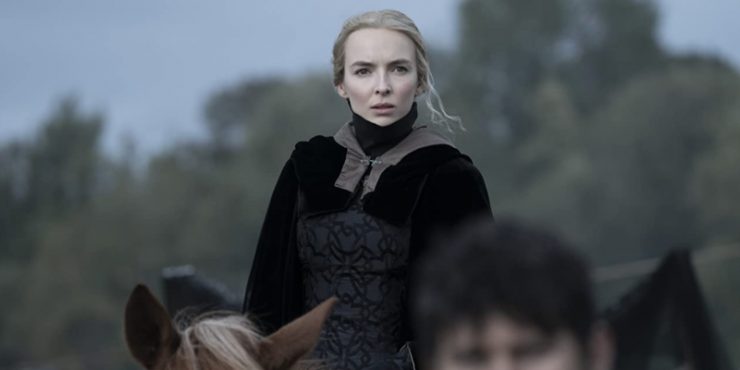The very title of The Last Duel promises bloodshed and it delivers. From early on, we get Game of Thrones-level brutality, blood spurting and spraying everywhere, battles coming down to excruciating slaughter. But The Last Duel is also Rashomon, a story told from different vantage points, each version realigning sympathies and reestablishing context. It is a matter of life and death, but it is also a tale of honor, loyalty and the price paid for nobility. This is medieval times in France, with the plague raging and The Crusades just around the corner. Times are harsh and many people are suffering, if not from illness than from poverty. There’s a reason that the French had all but outlawed duels to the death, but one incident arises to bring the tradition back to the forefront.
The script is by two of the film’s stars (and noted Hollywood besties) Matt Damon and Ben Affleck, as well as accomplished indie filmmaker/screenwriter Nicole Holofcener. At director, it’s Ridley Scott, perhaps the most esteemed action director of all time. If this seems like a weird mix of talent, well, you’re right. It’s a contrast of storytelling sensibilities and filmmaking egos. The resumes would seem to offset each other. Add to that, The Last Duel is one of those period epics that takes place in France and yet all of the characters are speaking a smattering of accented English, with some husky American, smooth English and even some Scottish. And yet, The Last Duel is surprisingly harmonious in its narrative, even if it is a particularly harsh one.
The story is simple. Damon plays a Sir John de Carrouges, a knight and warrior whose bravery is more pigheaded than valiant. Carrouges’ workmanlike disposition and heavily scarred face leave him outside of the higher social circuit of his direct superior Count Pierre d’Alençon (a brilliant Affleck). Carrouges’ friend and fellow knight, Jacques Le Gris (Adam Driver), is much closer with the Count, and while Le Gris stands up for Carrouges’ fierceness as a soldier, the Count still finds Carrouges unsightly and unworthy. When Carrouges marries Lady Marguerite (Jodie Comer), the daughter of a wealthy landowner trying to settle debts and fight off accusations of treason, Carrouges believes he is receiving a healthy land dowry. When he learns that the land is instead going to Le Gris, tensions flair. And then a major accusation is made, that will send the entire story into a spiral.
When Marguerite is sexually assaulted by Le Gris, Carrouges challenges him to a duel to the death. In a matter of he said/she said (and neither side willing to back down), the duel is a way for God to decide who is right. Or so they say. The script is told in three chapters: the first is the truth according to Carrouges, the second according to Le Gris, and finally the truth of Marguerite. Each version has subtle differences, but mostly the points of view reveal biases and self-compromises. Carrouges views everything through the prism of honor and pride, while Le Gris is a man of thought and passion, whose good fortune blinds him to his own misdeeds. For Marguerite, she is simply trying to survive an existence caught between the skirmishes of two former friends. While the script doesn’t say explicitly, it seems likely that her account is the most accurate.
I’ll go ahead and credit Holofcener with making this more than a story of male cruelty and its consequences. She is perhaps the most accomplished American screenwriter in terms of creating complex female characters (even while being a subpar visual storyteller, her films are exceptional because of her writing and the performances she coaxes). The challenge of including a legitimate female narrative in this otherwise very male film is not a small task. Comer, an actress whose performance on Killing Eve is among the best I’ve seen on any television show, is dealing with a lot of complex stuff here. She’s smarter than her husband and braver than Le Gris gives her credit for. Comer manages to give Marguerite more dignity than a simple victim, defending her own honor in a time when a woman doing so could be a death sentence.
As Ridley Scott has gotten older, his films have only become more unforgiving and violent. Once a master of tension and mood, he has instead become a director of empty spectacle. The Last Duel is his best film in quite a long time, and one that benefits from his talent for gridiron brutality. His characters often suffer from a particular masculine vanity and few of his films have taken advantage of that as well as this one. Actors-writers-producers Damon and Affleck (a duo whose own see-sawing relationship with success deserves its own film) deliver a true epic, and while Damon gets the featured role, Affleck’s Count gets the best lines and steals every scene he’s in. Driver’s Le Gris is the most mercurial of them all, and the one whose guilt is most subject to who’s telling the story, but this is him at his best; a charming hunk who gives way to dastardly menace.
What may standout about all else while watching The Last Duel is how much of an adult film it is, dealing with serious issues from the past that are just as relevant today. That this is a major studio production that isn’t some form of existing IP, but instead using gruesome violence and frank details regarding gender and sexuality to earn a hard R makes it a bit of a unicorn by today’s mainstream movie standards.
Directed by Ridley Scott










